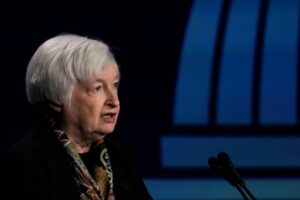“All animals are equal, but some animals are more equal than others,” wrote George Orwell in the novel Animal Farm. March has turned out to be one of the most critical months of the Biden administration, with all the president’s men and women confirming that this seminal quote is the White House’s mantra. From ESG investment funds to banks with affluent and connected depositors, Washington is continuing the tradition of choosing winners and losers in the US marketplace.
Bailing Out ESG
President Joe Biden vetoed the first bill of his term, rejecting legislation that would have reversed a Labor Department rule allowing fiduciaries to incorporate ESG (environmental, social, and governance) into retirement plan fiduciaries’ investment decisions. But while Biden says that this “common sense” veto encourages fund managers to “maximize financial returns for retirees across the country,” the data show that ESG funds perform poorly in financial terms.
Last year, investment vehicles linked to ESG principles – Black Rock’s Shares ESG Aware MSCI USA exchange-traded fund (ESGU) and Vanguard’s ESG US Stock ETF (ESGV), for example – did worse than the S&P 500. So far this year, the ESGU and ESGV have fallen behind the broader index ETFs, such as iShares Core S&P 500 ETF (IVV) and Invesco QQQ Trust Series 1 (QQQ). Here is a look at how they have performed year-to-date as of March 21:
- ESGU: +4.29%
- ESGV: +5.96%
- QQQ: +16.2%
- IVV: +4.5%
The ESG funds enjoyed a notable bump after the veto, rallying around 1.6% on the news.
Instead of facilitating an environment of maximizing investors’ returns, a woke fund manager could disregard trends, developments, and research and focus on being green. Indeed, if the market is not showing interest in wokenomics – a growing number of financial institutions and prominent investors have signaled their disinterest in ESG – the woke industrial complex should be allowed to implode on its own without being given a lifeline by the federal government, especially for political purposes.
SVB Versus the World

Janet Yellen (Photo by Drew Angerer/Getty Images)
If JPMorgan Chase, Wells Fargo, or Bank of America failed tomorrow, the US government and the Federal Reserve would intervene. This is the worst-kept secret in Washington today. But would a small community bank in Oklahoma or Mississippi be afforded the same taxpayer-funded or Federal Reserve-supported privilege? Treasury Secretary Janet Yellen does not think so.
Appearing before the Senate Finance Committee last week, Yellen told Sen. James Lankford (R-OK) that the United States would only bail out banks if they posed a “systemic risk” to the financial system as Silicon Valley Bank and Signature Bank did. However, she attempted to do damage control and reverse this position in prepared remarks in front of the American Bankers Association (ABA), noting that the government could guarantee deposits if the banking crisis worsened.
“The steps we took were not focused on aiding specific banks or classes of banks. Our intervention was necessary to protect the broader U.S. banking system,” Yellen said. “And similar actions could be warranted if smaller institutions suffer deposit runs that pose the risk of contagion.”
In the end, why should one bank with Silicon Valley executives, Chinese Communist Party-linked firms, and tech bros be given bailout privileges while one entity in the forests of Arkansas with mom-and-pop depositors is not? As legendary comedian George Carlin said, “It’s a big club, and you ain’t in it.”
Green for Green

Joe Biden (Photo by Alex Wong/Getty Images)
Biden’s 2024 budget, which accrues $17 trillion in deficits over ten years, proposes eliminating an estimated $31 billion in federal tax fossil fuel subsidies and preferences, although oil and gas firms are still expected to receive approximately $10 billion in support. At the same time, the White House is handing out billions in generous incentives to the green energy industry, such as $1 billion for loan guarantees for clean energy systems, $50 million for the Department of Energy’s Solar Energy Technology Office, and $750 million to support energy efficiency and resilience in HUD-assisted and financed developments. How about neither sector garners tax dollars, particularly at a time when the cash-strapped American people endure negative real wage growth and $4 eggs?
Winners and Losers
The White House insists that nobody is above the law and everyone must pay his or her fair share. But the current administration’s actions suggest that wealthy depositors at certain banks are above the standard $250,000 insurance limit that everyone else must adhere to, and companies should be provided with tax breaks if they advance the progressive cause. Of course, this is nothing new, as economic regulation in itself selects winners and losers. In a perfectly oriented economy or free society, no business or individual would garner taxpayer money, deficit-financed funds, money-printing fruits, or regulatory advantages. Instead, what we have here is a failure to adhere to economist Milton Friedman’s radical idea of being free to try, free to succeed, and free to fail.
Do you have an opinion about this article? We’d love to hear it! If you send your comments to [email protected], we might even publish your edited remarks in our new feature, LN Readers Speak Out. Remember to include the title of the article along with your name, city, and state.
Please respect our republishing guidelines. Republication permission does not equal site endorsement. Click here.

